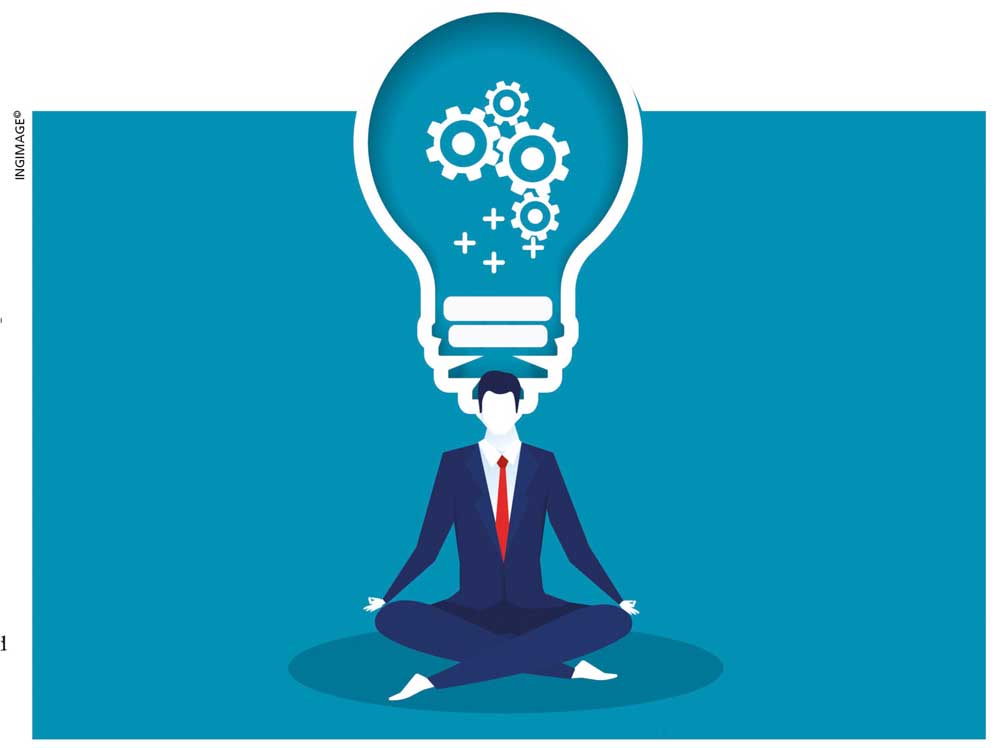MINDFULNESS POLICIES

FOCUSSING ON THE PRESENT
Manilka Ediriweera discusses the impact of mindfulness on organisations

Most people aren’t happy or satisfied with their jobs, and several polls have revealed that an estimated 73 percent of the global working population are dissatisfied with the work they do. If you were to go up to someone and ask them whether they’re happy with their job, the answer most likely would be ‘no.’
This is a worrying phenomenon because employed people spend most of their time in the workplace, which unfortunately brings them little happiness.
In this scenario, individual development or satisfaction, and the growth of business or even a whole community, is affected. Unhappy employees tend to be less productive, resilient, engaging and innovative.
Rising levels of stress in addition to worry and burnout are aggravating this situation, and imposing massive costs on organisations. Since there’s a need to mitigate or eliminate this issue entirely, one of the main ways that organisations have responded is by promoting mindfulness.
So what is mindfulness?
It can be defined as the basic human ability to be present in the moment, be aware of where you are and what you’re doing without being overwhelmed with what’s happening around. In simpler terms, it is the practice of focussing on the present.
Now that we’ve established what mindfulness is, let’s move on to how it can help create a more productive, engaging and positive workplace.
At first glance, the concept of developing mindfulness to create a productive, engaging and positive workplace may seem absurd. However, multiple studies have shown that developing mindfulness is critical to creating a healthy workplace.
Is this still hard to believe?
Well, perhaps the following examples will address your doubts…
German multinational software company SAP saw a 200 percent return on investment after its mindfulness programme was implemented; it has seen a rise in employee engagement as well as a drop in absenteeism.
Other giants such as LinkedIn, Intel and Aetna have also experienced positive results by implementing their own mindfulness programmes.
The related ROIs were recorded as follows: LinkedIn witnessed an increase in skilled applicants and Intel observed enhanced employee wellbeing while Aetna experienced a 28 percent reduction in the stress levels of employees and increased efficiency, which resulted in workers gaining an average 62 minutes of productivity every week each.
Furthermore, employees in high tension occupations such as healthcare and call centre work reduced their stress levels – as well as improved their general health – through mindfulness training.
Enterprises can achieve such salutary results because training individuals to be more aware and present helps sharpen their focus, reduce stress, activate creativity, improve productivity, and enhance relationships and performance.
The practice of mindfulness inculcates peace in our lives, and allows us to experience and appreciate each moment in life.
Let’s dive deeper into the benefits of mindfulness in the workplace…
RELATIONSHIPS Given the fast-paced nature of life and all the distractions one faces, we seem to have lost our ability to be present in the moment, communicate smoothly and listen actively.
This has also impacted the quality of relationships.
Mindfulness trains us to be more present, aware and focussed; and eventually, our relationships will improve.
STRESS CONTROL Stress levels have been rising worldwide over the last decade or so. Employees can become stressed for various reasons such as long hours, unhealthy relationships with coworkers and so on. And such stress levels can impact the performance of both individuals and the business as a whole.
A study carried out with call centre employees who had received mindfulness training reported lower stress levels, which ultimately improved customer satisfaction.
CREATIVITY This is a state of mind whereby it’s essential to be in the right headspace. If you are stressed or not present in the moment, it’s difficult to solve problems. By practising mindfulness therefore, one can avoid negative thoughts and be open to new ideas.
EQ FOCUS When being present in the moment, as well as aware of where we are and what’s happening in the vicinity, we tend to focus on the people around us. We begin noticing how others around us feel. It also helps people keep their emotions in check and make better use of them.
All of this suggests that when you engage in mindfulness, the more focussed, compassionate, authentic, creative and resilient you will be.
Mindfulness is a skill that anyone can embrace and develop to gain outstanding results. So it’s time to embrace mindfulness, which has been gaining momentum across the globe, and start building a healthier workplace for everyone. The benefits will be immense.




Leave a comment